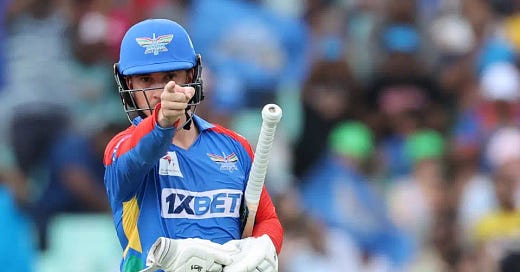Before his fourth birthday, Matthew Breetzke pointed to a red cricket ball. He wanted it. So, when his father gave him one a few months later, it was the perfect birthday present. According to Kirk, his father, that is all Breetzke wanted: balls. Cricket balls, ping-pong balls, tennis balls, rugby balls, any form of ball. But he loved the cricket ball more than the rest.
Breetzke took that ball everywhere. To the shops, to church, on family vacations, to bed. At cricket matches, the ball seemed to be Breetzke’s connection with the players on the field. Breetzke would stand as close to the boundary rope as he was allowed with his ball in hand as he watched his brother, Chad, play school cricket.
When he turned six, Breetzke received his joint-favourite thing ever, a sticker-adorned Wormwood bat. Almost immediately after handing the bat to young Matthew, Kirk Breetzke hung a cricket ball from the rafters in a sock. He figured his son could do with a bit of hitting practice. That spot became Breetzke’s world. “He would hit that ball for hours. When we tried to stop him, Chad intervened, asking us to leave the little man alone,” says Kirk.
When he wasn’t imagining dispatching that ball over imaginary fielders, Breetzke faced deliveries from his brother, Chad. Chad, who was a keen cricketer as a youngster, shared everything he knew with his younger brother and threw him thousands of balls in the process. When he wasn’t available, Kirk stepped in and threw a fair share of deliveries. When the Breetzke family went on holiday, Breetzke carried his bat and the sons found ways to improvise cricket matches.
According to Richard Gilbert, Breetzke’s first XI coach at Grey High PE, the more balls he hit the better he felt. Breetzke often asked for throws before practice or just went to train with Old Grey Cricket Club after practice. Sometimes he did both. “He wasn't a particularly keen academic but certainly was above average. Most of his time was taken up with hitting balls so I'm not sure how much work got done at home. Cricket was certainly a big release for him from the classroom,” says Gilbert.
This newsletter is 100% reader-supported. If you’re willing and able, please consider supporting it in one of two ways, leaving a tip or becoming a Patreon. Thank you so much for your time and investment!
20 years after his father hung the ball from the rafters, Breetzke wasn’t imagining himself decimating bowlers, he was doing it against the Paarl Royals. His first boundary was fortuitous. It was the sixth delivery he faced, short in length, just outside off stump. Breetzke tried to cut it one, but instead, the ball found a thick outside edge and flew away up and over the slip fielder before racing to the fence for four.
After that, he was in control. He drove, cut, pulled, swept and reverse-swept his way to a 43-ball 78 runs that featured five fours and six sixes at a strike rate of 181.39. Three of those boundaries came off the last three balls of the 12th over. First, he picked dispatched a slower ball over long-off, then he drove the next deliveries over deep point for another six and finished the over by smashing the ball to deep point for a four. With those 16 runs, Breetzke brought up his maiden SA20 half-century. It came off 30 balls.
As part of his celebration, Breetzke pointed at one of the cameras. His knock was a statement. Coming into this match, Breetzke had scored 223 runs off 166 balls in seven games for an average of 31.86 at a strike rate of 134.34. With the exception of two matches where he scored less than 15 runs, Breetzke laid the foundation for Durban Super Giants’ explosive middle order, primarily Heinrich Klaasen, to catch fire and take the game away from the opposition.
Breetzke was DSG’s most consistent batter, and that wasn’t good enough for some people. They wanted the big innings. He was only good for 20s and 30s, they said. His maiden SA20 half-ton was a message to them. He wasn’t just good for 20s and 30s, he had a few scores in the 40s and could score 50 or more. As he did when he was a youngster playing in Gilbert’s team, for whom he scored 17 centuries, Breetzke let his bat do the talking.
To learn a little more about Matthew Breetzke, read more:
If you found this interesting, please share it:
You can support Stumped! by leaving a tip:
Thanks for reading. Until next time… - CS





